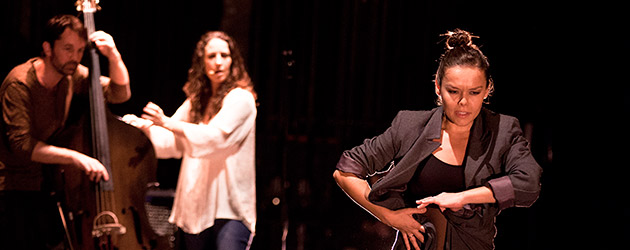Text: Estela Zatania
Photo: Tamara Pinco
Rocío Molina «Afectos»
Saturday, January 18th, 2014. 8:00pm. Teatro Bernadette Lafont, Nimes (France)
Child prodigy, prodigious adult
The last day of the Nimes flamenco festival there were three very different presentations. At midday, my colleague José María Castaño offered his interesting wine-tasting, an excursion through the world of Jerez flamenco, via the characteristic sherry only produced in Jerez.
At five o’clock, a very special sort of cante recital took place at the Emmanuel d’Alzon Institute. Two old-timers with decades of flamenco memories and knowledge, Manuel Márquez “El Zapatero” and Antonio Ruiz “El Carpintero”, from Triana and Morón de la Frontera respectively, reminded us all where the flamenco we all know and love comes from. With the splendid guitar of Dani de Morón, who did a fine job of accommodating this relic of times past, they sang tangos, malagueñas, siguiriyas, lots of soleá, and martinete to close, generously giving their delightful explanations along the way.
It’s a mystery why certain artists feel compelled to reject traditional flamenco forms and seek an identity outside the box. A genius is a genius, whether they dance, sing or play guitar. Take Rocío Molina. While still an adolescent, and having learned to dance conventional flamenco extremely well, she felt the need to be “different”, to surprise, not only with new steps or novel choreographic concepts, but rather inventing a whole new system of her own. It’s a professional obligation – anything else would be negligence on my part – to warn flamenco fans that they must not approach this work in hopes of finding flamenco. It’s there. But in small sporadic, although brilliant doses, no question about it. But what’s being sold here is absolute precision of movement, meticulous clarity, original moves and Rocío’s extraordinary dialogue with singer, and on this occasion guitarist, Rosario “La Tremendita”. It’s the antithesis of the spontaneity we’re accustomed to finding in flamenco. The work comes off as a series of technical feats, without this meaning an absence of artistic worth, quite the contrary. It’s a type of communication as valid as that which takes place within a predetermined structure, and it allows the interpreter to fly solo. The very forms that are the key to creative freedom for classic artists, are a straightjacket for the prodigious Rocío Molina.
Having accepted those conditions, and everything they imply, you may now take your seat and prepare to enjoy this work of Rocío Molina called “Afectos”. The first twenty minutes are frankly slow, and overall, the show is guilty of oppressive darkness, the scourge of flamenco in the new millennium – it’s surprising Rocío indulged in this cliché. But then things pick up, and you enter the parallel world of Rocío Molina where everything is familiar but transformed, the law of gravity isn’t quite what it used to be, musical instruments play themselves and time runs in any direction. In this, her world, Rocío is self-sufficient. She needs neither cante nor compás as most people understand it. Moves you’ve never seen before in flamenco or anywhere else, lots of footwork and novel percussion, designer palmas and a sublime sense of humor when you least expect it trigger effusive cheering throughout the show.

The audience that goes to see a Rocío Molina show, knows what to expect, and the young performer is generous with her genius. There is the occasional repetitive patch, but such moments are forgiven with the bulerías of Rocío and Tremendita at point-blank range, the tangos of Triana that maintain their flavor “despite” their extremely contemporary character, the stylized petenera with Rocío’s hieroglyphic dancing and the almost comical rumba Café con Ron. These are the roadsigns that guide the way along this young artist’s creative path.
Pablo Martín completes the cast of three with his upright bass and his ability with the sampler, the only musical accompaniment aside from Tremendita’s guitar.
With this spectacular presentation, the Festival de Nimes wraps up its twenty-fourth edition, and looks toward next years silver anniversary.
